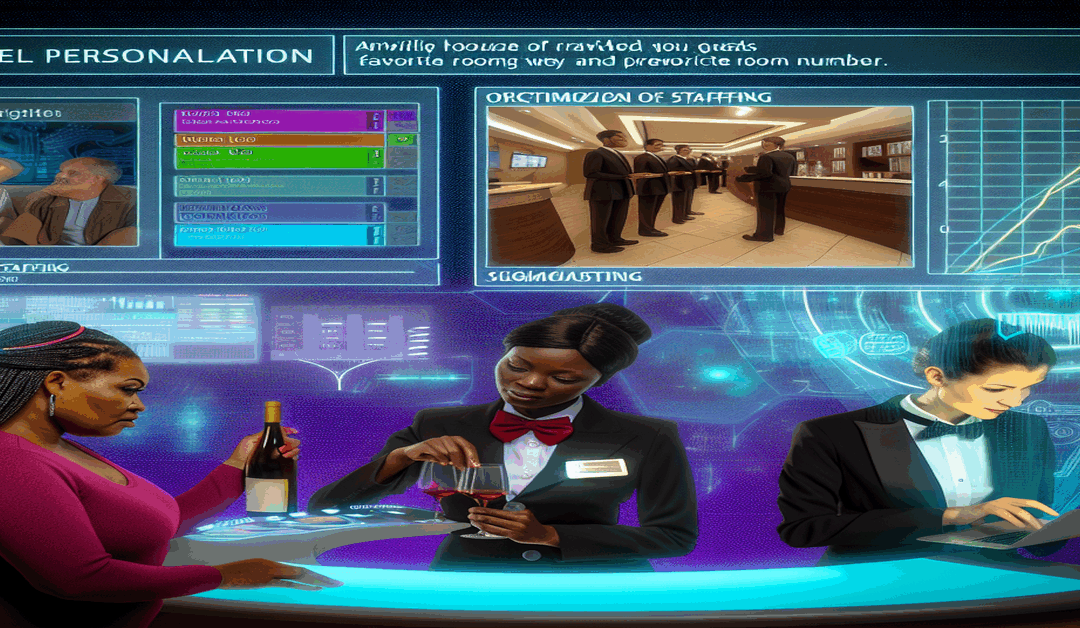Transforming the Hotel Guest Experience with Personalization and Predictive Analytics
In today’s highly competitive hospitality industry, hotels are constantly seeking ways to elevate the guest experience and stand out from the crowd. Two powerful tools that are revolutionizing the way hotels approach guest satisfaction are personalization and predictive analytics. By leveraging these strategies, hotels can create tailored experiences that leave a lasting impression on guests, ultimately leading to increased loyalty and revenue.
The Power of Personalization
Personalization has become a buzzword in the hospitality industry, and for good reason. Today’s travelers crave unique, customized experiences that cater to their individual preferences and needs. As Dana Cariss, a revenue strategy expert, emphasizes, tracking guest spend and using tailored messaging is crucial for maximizing revenue and delivering experiences that guests want to return for[2].
By collecting and analyzing guest data, hotels can gain valuable insights into their customers’ preferences, allowing them to create personalized offers, recommendations, and experiences. For instance, if a guest has previously expressed interest in spa services, the hotel can proactively suggest relevant treatments or packages during their next stay. This level of personalization not only enhances the guest experience but also demonstrates that the hotel values and understands their individual needs.
Harnessing the Potential of Predictive Analytics
While personalization focuses on tailoring experiences based on past behaviors, predictive analytics takes it a step further by anticipating guest needs before they even arrive. By analyzing historical data, such as previous bookings, guest preferences, and spending patterns, hotels can create targeted offers and experiences that are likely to resonate with each guest[2][3][4].
For example, if a guest has a history of booking rooms with a view, the hotel can proactively assign them to a room that meets this preference, without the guest having to make a special request. This level of **anticipation** and **proactivity** can significantly enhance guest satisfaction and loyalty.
The Importance of Segmentation and Comprehensive Tech Systems
To effectively utilize personalization and predictive analytics, hotels must have robust data segmentation practices and comprehensive technology systems in place. Segmenting guest data allows hotels to identify patterns and preferences among different guest groups, enabling them to create targeted marketing campaigns and personalized experiences[2][4].
Moreover, having a comprehensive tech stack that integrates various systems, such as property management systems (PMS), customer relationship management (CRM) software, and data analytics tools, is essential for collecting, analyzing, and acting upon guest data effectively. By breaking down data silos and creating a holistic view of each guest, hotels can make data-driven decisions that enhance the guest experience and drive business success.
Real-World Examples and Benefits
Several leading hotel brands have already embraced the power of personalization and predictive analytics, with impressive results. Marriott International, for instance, has developed a “Guest Experience Score” that uses predictive analytics to anticipate guest needs and preferences, allowing them to deliver highly personalized experiences[4].
Similarly, Hilton has leveraged predictive analytics to optimize staffing levels and promotional offers based on forecasted demand, leading to increased efficiency and revenue[5].
The benefits of implementing personalization and predictive analytics are clear: increased guest satisfaction, higher revenue, and more efficient operations. By delivering experiences that **resonate** with guests on a personal level, hotels can foster a sense of loyalty and encourage repeat visits, ultimately driving long-term success in an increasingly competitive market.
Embracing the Future of Guest Experience
As the hospitality industry continues to evolve, personalization and predictive analytics will play an increasingly crucial role in shaping the guest experience. Hotels that embrace these strategies and invest in the necessary technology and data management practices will be well-positioned to meet the ever-changing needs and expectations of modern travelers.
By staying attuned to industry trends and continually refining their approach to personalization and predictive analytics, hotels can create truly memorable experiences that set them apart from the competition and foster long-lasting relationships with their guests.
#HotelIndustry #Personalization #PredictiveAnalytics
-> Original article and inspiration provided by ReviewAgent.ai
-> Connect with one of our AI Strategists today at ReviewAgent.ai

